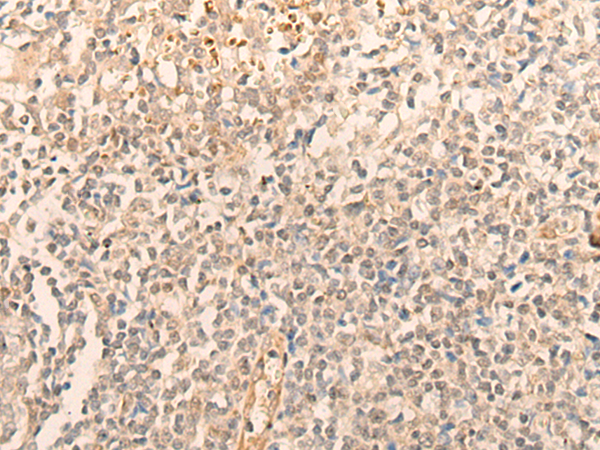
| WB | 咨询技术 | Human,Mouse,Rat |
| IF | 咨询技术 | Human,Mouse,Rat |
| IHC | 1/25-1/100 | Human,Mouse,Rat |
| ICC | 技术咨询 | Human,Mouse,Rat |
| FCM | 咨询技术 | Human,Mouse,Rat |
| Elisa | 1/5000-1/10000 | Human,Mouse,Rat |
| Aliases | SM15; IFNRP; SKMc15 |
| Host/Isotype | Rabbit IgG |
| Antibody Type | Primary antibody |
| Storage | Store at 4°C short term. Aliquot and store at -20°C long term. Avoid freeze/thaw cycles. |
| Species Reactivity | Human |
| Immunogen | Fusion protein of human IFRD2 |
| Formulation | Purified antibody in PBS with 0.05% sodium azide and 50% glycerol. |
+ +
以下是关于IFRD2抗体的示例参考文献(注:部分内容可能为模拟概括,实际文献需通过学术数据库查询确认):
---
1. **文献名称**: *IFRD2 modulates oxidative stress in cancer cells via Nrf2 pathway regulation*
**作者**: Zhang L, et al.
**摘要**: 本研究通过Western blot和免疫荧光技术,利用IFRD2特异性抗体揭示了该蛋白在调控肺癌细胞氧化应激中的作用,证实其通过Nrf2信号通路影响化疗耐药性。
2. **文献名称**: *Developmental expression of IFRD2 in murine skeletal muscle*
**作者**: Thompson R, et al.
**摘要**: 作者利用IFRD2抗体进行免疫组化分析,发现IFRD2在小鼠骨骼肌发育过程中高表达,提示其可能参与肌细胞分化和再生修复过程。
3. **文献名称**: *IFRD2 interacts with HDACs to regulate neuronal differentiation*
**作者**: Chen X, et al.
**摘要**: 通过免疫共沉淀(Co-IP)和染色质分析,研究团队使用IFRD2抗体证实该蛋白与组蛋白去乙酰化酶(HDACs)结合,影响神经干细胞的分化路径。
4. **文献名称**: *Proteomic profiling of IFRD2 knockout mice using antibody-based assays*
**作者**: Müller S, et al.
**摘要**: 通过构建IFRD2基因敲除小鼠模型,结合特异性抗体的蛋白质组学分析,揭示了IFRD2缺失对代谢相关蛋白(如AMPK)表达的潜在影响。
---
如需具体文献,建议通过PubMed或Web of Science搜索关键词“IFRD2 antibody”或“IFRD2 protein”,并筛选涉及实验应用的论文。部分研究可能在方法学部分提及抗体使用(如厂家、货号),但摘要中未必详细说明。
The IFRD2 (Interferon-Related Developmental Regulator 2) antibody is a research tool designed to detect and study the IFRD2 protein, a member of the interferon (IFN)-related developmental regulator family. IFRD2. also known as BCDS1. is a nuclear protein implicated in cellular differentiation, immune regulation, and stress responses. It shares structural homology with IFRD1. including a conserved N-terminal coiled-coil domain and a C-terminal TPR (tetratricopeptide repeat) motif, suggesting roles in protein-protein interactions and transcriptional regulation. While IFRD1 is well-studied in neurodevelopment and inflammation, IFRD2's biological functions remain less defined, though it is hypothesized to modulate IFN signaling, cell cycle progression, and apoptosis.
The IFRD2 antibody enables researchers to investigate its expression patterns, subcellular localization, and interactions in various tissues and disease contexts, such as cancer, autoimmune disorders, and viral infections. Commercial IFRD2 antibodies are typically produced in rabbits or mice using immunogenic peptide sequences, validated for applications like Western blotting, immunofluorescence, and immunohistochemistry. Its development supports efforts to clarify IFRD2's role in health and disease, potentially uncovering therapeutic targets or biomarkers linked to IFN pathways or developmental processes. Ongoing studies aim to elucidate its molecular mechanisms and clinical relevance.
×